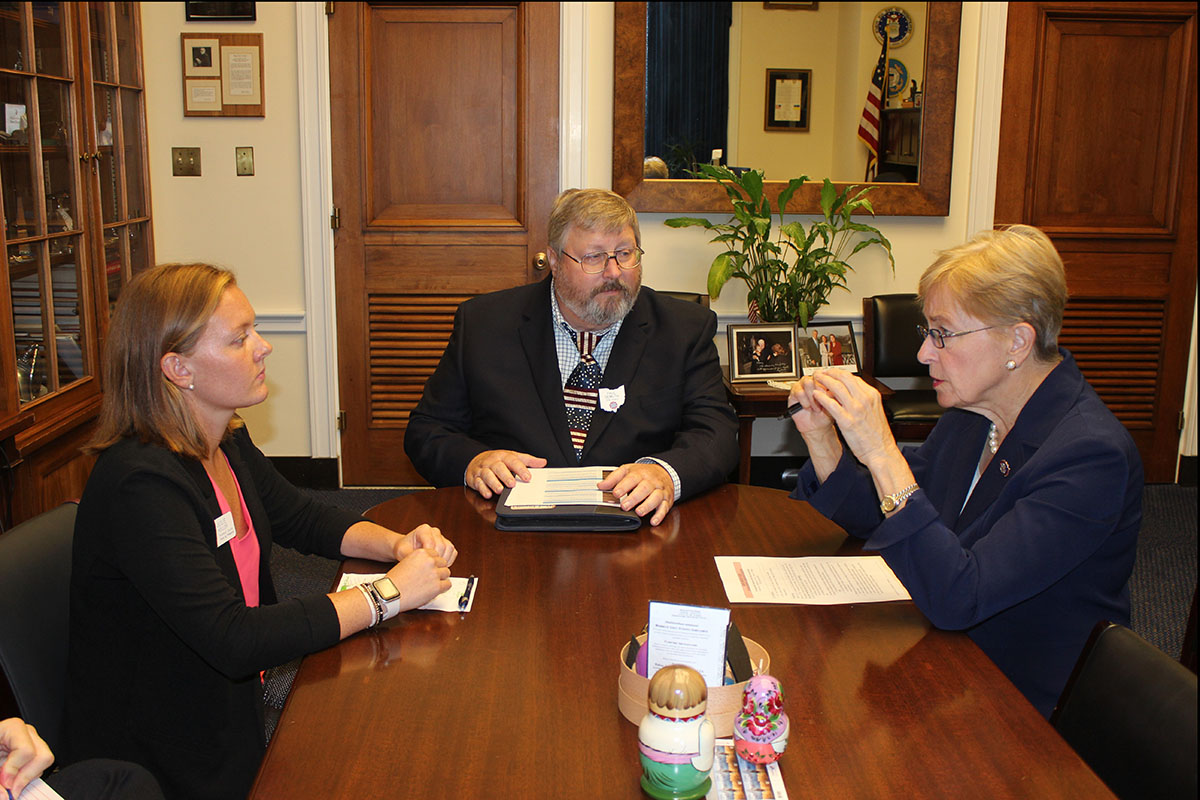
WASHINGTON — If he hadn’t been spending three September days in Washington, Evan Schaefer would have been getting a combine ready for harvest on his family’s Mahoning County, Ohio, farm. Corky Saiter could have been making hay on his Jefferson County farm, and Julie Holler would have been milking, feeding calves and breeding cows on the Trumbull County dairy where she works as a herdsman.
But, for them, spending a few days studying federal agricultural policy and meeting with members of Congress was worth a few days away from their farm work.
Schaefer, Saiter and Holler were among 112 Ohio Farm Bureau Federation members who gathered for the organization’s Washington, D.C., Leadership Experience Sept. 13-15. The group included county farm bureau board presidents, as well as members of the farm bureau’s Young Agricultural Professionals group and AgriPOWER leadership class.

Farm Bill planning
A new farm bill is due in 2023, so the OFBF group worked on priorities for the upcoming legislation. Brandon Kern, OFBF director of state and national policy, explained farm bureau supports funding for programs that help farmers manage risk, including federal crop insurance and the Title 1 commodity programs.
At this point, it’s important for farmers to “set the stage” with their elected officials, Kern said. The farm bill will affect the nation’s food security, which is vital to national security.
“We’re helping them connect the dots,” he said.
Andrew Walmsley, senior director of government affairs for the American Farm Bureau Federation, said many members of Congress will be working on a farm bill for the first time. The election in November has many open seats to fill “that will determine who writes the new farm bill,” he added.
Sen. Sherrod Brown, a Democratic member of the Senate Agriculture Committee, has already started holding roundtable meetings with farmers to discuss the bill. So far, he’s been hearing that inflation and rising input costs are what concern farmers most.
Funding for conservation programs is also a priority.
“We want to write them so that they can be at least neutral, maybe a bit of a money maker for farms and farmers,” Brown said.

In addition to Brown, who is working on the farm bill from the Senate side, Ohio has three U.S. Representatives on the House Agriculture Committee: Republican Troy Balderson and Democrats Marcy Kaptur and Shontel Brown.
Kaptur told the group she’s particularly impressed with the existing Senior Farmers’ Market Nutrition Program, which is funded through the farm bill. That program helps both the senior citizens and local farmers, she said.
Kaptur is also looking for initiatives to promote healthy soil. The farm bill needs to include protection for agricultural land, especially productive land like that found in Ohio because so much land in the West is becoming less productive due to water concerns, she said.
Rep. Shontel Brown was first elected to Congress in 2021 and said she was eager to learn about the farm bill. She represents one of the most food insecure districts in the country, so the farm bill’s food assistance programs are a priority for her, she said.
The ranking Republican on the House Ag Committee, Glenn Thompson, of Pennsylvania, emphasized the importance of farmer input on the farm bill.
“You don’t want us writing any piece of legislation — let alone the farm bill — just listening to people in the bubble,” he said.
Greenhouse gas reporting. A proposed rule being considered by the Securities and Exchange Commission would require publicly traded companies to report emissions of greenhouse gas throughout their supply chains.
Sam Kieffer, American Farm Bureau vice president of public policy, told the group that the proposal could lead to reporting requirements for nearly every farmer.
“Unless you’re direct marketing, chances are what it is you produce touches a publicly traded company somewhere,” Kieffer said.
The proposed rule arose partly because some companies are trying to “out-green” one another with environmental claims. Many of those claims cannot be substantiated, Kieffer said,
If reporting requirements are extended to farms, the burden of recordkeeping for fuel use and fuel efficiency on farms would fall on farmers, Kieffer said. Data privacy could also be a concern.
The national and Ohio farm bureaus have sent the SEC recommendations to remove the “value-chain” provisions from the proposed rules. They support market-based approaches to carbon sequestration instead.
Sen. Sherrod Brown, who has supported the SEC’s proposed rules, clarified his position during a meeting with ag media.
“I want to make sure the big guys are held accountable,” he said. “In the end, it’s rarely the small producers, whether it’s a small business or a small farm or a small not-for-profit. They are rarely the ones that violate or jeopardize the public interest.”Defining exactly who those “big guys” are is a conundrum, Brown said, “You need the regulators to draw those lines.”
Friendly farewells

Sen. Rob Portman, who is retiring from the Senate at the end of his term in January, has been a friend to agriculture throughout his political career, said Adam Sharp, Ohio farm bureau executive vice president.
Portman told the group that he’ll be spending more time at his Warren County farm, where he helps his son make maple syrup and raise vegetables for his family’s restaurant in Lebanon, Ohio.
He has also entered the cattle business with six cows, six calves and one steer.
“All hat and no cattle, as they say,” he joked.
Sharp also thanked Rep. Bob Gibbs for his service to farmers throughout his political career.
Gibbs, who did not run for reelection, told the group his political career started with his involvement in the farm bureau. He recalled coming on a similar trip to Washington, D.C., years ago as Holmes County Farm Bureau president. Gibbs served on the state board and was elected president of the Ohio farm bureau before seeking elected office.
“If you don’t like me in public office, you have the Ohio Farm Bureau to blame,” he said.










